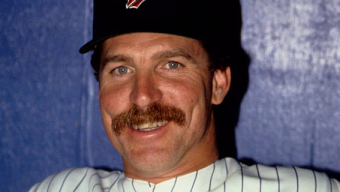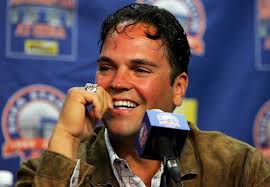Editor’s Note: All three golferswest.com writers, Bob Sherwin, Jim Street and Kirby Arnold, covered baseball for various newspapers long enough to earn the right to vote for Baseball’s Hall of Fame. This year is especially controversial with all the first-year players from the ‘steroids’ appearing on the ballot. The HOF announcement will be next Wednesday. Below is Bob Sherwin’s perspective on his vote:
Many people believe, it’s my belief, that the baseball writers who vote annually for the Hall of Fame do so capriciously and with a substantial bias.
That’s half right. As for the capricious aspect, that’s no where near the truth. Speaking for all the baseball writers I know, we give this nomination process its deserved consideration. I know when I get the ballot the first of December every year it takes me the whole month to mull over my choices.
As for bias, that part is correct. We have the responsibility as to who gets in, so that gives us a natural bias toward doing it correctly. We stand by the door like a nightclub bouncer behind the velvet rope. We check IDs. We check authenticity. We compare those already in to those standing on the doorstep.
For better or worse, we are to ones who approve the credentials. Yea or nay. That job has been entrusted to us and our bias tends to bend toward merit, not whim.
It’s not a perfect system. There are some in there who don’t belong and some on the outside who deserve to be in. If there’s a better system, I haven’t seen it.
Now all the baseball writer/voters have the same method for determining the nominees. Everyone puts an emphasis on different elements. I don’t know what others do but here’s a brief outline of my perspective.
1. It’s an eternal honor based on career numbers. That’s why an All-Star MVP or four-home-runs-in-one-game or an 18-strikeout game do not hold much weight in the long view. Having said that, a outstanding effort in the post-season series, or a couple of career no-hitters or a long hitting streak begin to move the needle a bit.
2. Career numbers are important, especially compared to those already in. You look to see where they are vis-à-vis the plateaus, 300 wins, .300 career average (or number of .300 seasons), 3,000 hits, 500 home runs, 500 doubles, 500 stolen bases or 1,500 RBI.
3. Along with those numbers, you also have to take in account the player’s position, i.e., shortstop vs. DH or outfielder vs. catcher. Middle infielders, for instance, with solid power numbers and a healthy career batting average can climb quickly up the list.
4. Not a big fan of closers. I understand it’s the toughest three outs in a game, but saves may be one of the most overrated statistic in baseball. It’s also a moving target. Guys like Rollie Fingers, Bruce Sutter and Goose Gossage, already in the Hall, will have their numbers buried by many of today’s closers. Mariano Rivera and Trevor Hoffman have nearly double the saves as those three HOFs. A closer with 500 career saves one day may be just middle of the road.
5. Gold Glove Awards have a modest value. The reason is because many times the award, voted by opposing managers (or most likely, PR types), invariably is given to the guy with the best average. Or those guys with the best ‘name.’ Beyond that award, I think most writers know who the good ones are. They know the best defensive catchers, the best arms and surest hands. SS Omar Vizquel, for example, who likely will begin his five-year clock this year, may or may not have the greatest offensive numbers to get in but he was the greatest fielder – at any position – I’ve ever seen. That alone earns my vote.
6. There is also the factor of character. As the nomination letter states: Voting shall be based upon the player’s record, playing ability, integrity, sportsmanship, character and contribution to the team(s) on which the player played.” We’ve got some characters already in there, certainly plenty of racists from before the Color Barrier era, and bad dudes. But this clause is particularly important this year because of the steroid issue.
I’m not voting for the ‘rumored’ steroids guys for three reasons. One, it’s cheating, willingly, blatantly and extensively. It’s not like taking a ‘greenie’ to get a momentary advantage, these guys wanted a significant lasting edge and were willing to defiantly defy the rules, or tradition, to do it, causing a grotesque blip in career numbers and tainting the game’s time-honored records. Two, I’m waiting to see if baseball further clarifies how to characterize these guys. It’s not something we should deal with on the first ballot. This one needs time to pass.
Three, admit it. Not deny it, admit it. Congressional testimonies and court cases couldn’t bring it out. To me, that speaks to character, that speaks to integrity, sportsmanship. Just admit the use already and maybe over time attitudes will improve. It took 20 years for Pete Rose to finally admit his gambling on the game and, after that, sympathy swung back to him. He may be on a path to the Hall, or at least much closer than where he was during his denial period.
By the same token, there are some prominent local and national baseball writers who suspected steroids-using players and did nothing. Wrote nothing. Those same writers were even critical of stories and writers who did write about the subject. That’s disrespecting the game and their own profession. I suspect that they will ignore the drug abuse and vote the suspects in. Maybe that evens things out. We’re not a unanimous group, much like the rest of America.
At any rate, here’s my 2013 voting class, similar to Jim Street’s. I have five, one fewer than Jim, and we have three of the same guys, Craig Biggio, Jack Morris and Edgar Martinez.
Craig Biggio (first year on the ballot): A 20-year veteran who was a seven-time All-Star and five-time Silver Slugger, he converted from catcher to second baseman, as testament to his athleticism. A member of the 3,000-hit club, he is the only player ever to have 3,000 hits, 600 doubles, 400 stolen bases and 250 home runs. He is fifth all-time in doubles (688), first for a right-hand hitter.
Jeff Bagwell (third year): Voted for him the past two years because of his high production over his 15 seasons. He finished with a .297 career average with 2,314 hits, 488 doubles, 449 home runs, 1,529 RBI and 202 stolen bases. The unanimous selection for the 1994 MVP, he is a four-time All-Star, three-time Silver Slugger and the 1991 NL Rookie of the Year. He drove in 100 runs seven times and hit .300 or better six times.
Edgar Martinez (fourth year): Admitted bias here, as I covered Martinez for his entire career, but he has numbers that matter. He won a pair of batting titles, five Silver Sluggers and was a seven-time All-Star. He hit .300 or better 10 times and drove in 100 runs six times. He is one of 10 players to hit 300 home runs, 500 doubles and hold a career average more than .300 (.312). The Outstanding DH Award is named in his honor. He is part of the steroid bunch but did use an over-the-counter supplement that was later banned by the league.
Jack Morris (14th year, pictured above): Morris’ time is running out. This is his penultimate year on the ballot. I’ve always liked him for his grit and durability. He didn’t win 300 games (254) or the Cy Young Award in his 18 seasons, but had three 20-win seasons, 11 200-inning seasons and five All-Star appearances. He won the 1991 World Series MVP award with Minnesota, going 2-0 with a 1.17 ERA and had an outstanding 10-inning effort for a 1-0 victory in Game Seven. He led all pitchers in the 1980s with 162 wins and 133 complete games (175 in his career).
Mike Piazza (first year, pictured above): This should raise an eyebrow, seemingly going against what was said above. Piazza was a steroid guy. Much like Martinez, he took a substance before the league banned it. I’ll give him the benefit. He admitted it and, supposedly, quit doing it. He passes through the narrow hoop. Piazza finished with 396 home runs, most ever by a catcher. He’s a 12-time All-Star in his 16 seasons and an unprecedented 10-time Silver Slugger winner. He drove in 100 runs five times and hit at least .300 nine times. He finished with a career .308 average. He likely won’t make it this year and every year after this he’s going to come under a good measure of scrutiny.
BBWAA Rules for Election to the National Baseball Hall of Fame
1. Authorization: By authorization of the Board of Directors of the National Baseball Hall of Fame and Museum, Inc., the Baseball Writers’ Association of America (BBWAA) is authorized to hold an election every year for the purpose of electing members to the National Baseball Hall of Fame from the ranks of retired players.
2. Electors: Only active and honorary members of the BBWAA, who have been active baseball writers for at least 10 years, shall be eligible to vote. They must have been active as baseball writers and members of the Association for a period beginning at least 10 years prior to the date of election in which they are voting.
3. Eligible candidates: A — A baseball player must have been active as a player in the Major Leagues at some time during a period beginning 20 years before and ending five years prior to election.
B — Player must have played in each of 10 Major League championship seasons, some part of which must have been within a period described in 3(A).
C – Player shall have ceased to be an active player in the Major Leagues at least five calendar years preceding the election but may be otherwise connected with baseball.
D – In case of the death of an active player or a player who has been retired for less than five full years, a candidate who is otherwise eligible shall be eligible in the next regular election held at least six months after the date of death or after the end of the five year period, whichever occurs first.
E – Any player on Baseball’s ineligible list shall not be an eligible candidate.
4. Method of Election
A – A screening committee consisting of baseball writers will be appointed by the BBWAA. This committee shall consist of six members, with two members to be elected at each Annual Meeting for a three-year term. The duty of the Screening Committee shall be to prepare a ballot listing in alphabetical order eligible candidates who (1) received a vote on a minimum of five percent of the ballots cast in the preceding election or 2) are eligible for the first time and are nominated by any two of the six members of the BBWAA Screening Committee.
B – An elector will vote for no more than 10 eligible candidates deemed worthy of election. Write-in votes are not permitted.
C – Any candidate receiving votes on 75 percent of the ballots cast shall be elected to membership in the National Baseball Hall of Fame.
5. Voting: Shall be based upon the player’s record, playing ability, integrity, sportsmanship, character, and contributions to the team(s) on which the player played.
6. Automatic Elections: No automatic elections based on performances such as a batting average of .400 or more for one year, pitching a perfect game or similar outstanding achievement shall be permitted.























Pingback: Hall of Fame voter sells ballot to Deadspin, readers to determine votes | The Daily Float - America's Internet Newspaper